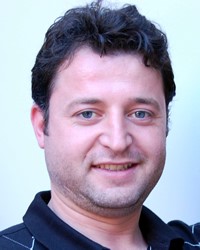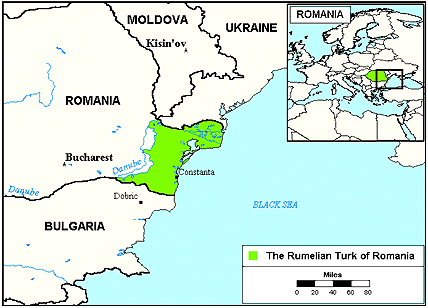The Turks of Romania are often referred to as the Osmanlis, the Rumelian Turks, and the Balkan Turks, (Rumelia means "land of the Romans" and refers to the Balkan Mountains). They are the descendants of the Ottoman Turks who migrated from their central Asian homeland, conquered Anatolia (modern day Turkey), and eventually established the Ottoman Empire. At its peak, the Ottoman Empire encompassed the Balkan Mountains, Arabia and North Africa. At one time, the empire also threatened to take over Vienna. Romania was part of the Ottoman Empire for more than 300 years, until the country gained its independence in the 1860s.
During the long Ottoman Empire reign, Rumelian Turks often settled in Balkan towns and served as military personnel or administrators or worked as craftsmen. During the late eighteenth century, many Crimean Tatars and Circassians from the Caucasus migrated to the Dobruja region where they were given land by the Ottoman government. The immigrants formed farming villages, adopted the Turkish language and religion, and intermingled with Rumelian Turks.
There are still Turkish people living in Romania just as there are Turks in many other Eastern European countries.
Lamb, a favorite meat of the Turks, is typically prepared as a pilaf (rice and oil cooked with small bits of meat). Turks relish sweets, and they are especially fond of Turkish delight (a gummy confection usually cut in cubes and dusted with sugar). The Muslim religion forbids drinking alcoholic beverages; instead, the Turks drink lots of strong coffee and yogurt.
Through the decades, Turks have contributed to Romanian society in the arts, sports, academics and politics.
Wherever they live Turks are Sunni Muslims. "Sunni," is derived from the Islamic term, sunnah, which means "well-trodden path. " Sunnis believe that the correct path is that of the majority. They believe that the One, Supreme God, Allah, spoke through his prophet, Mohammed, and taught mankind how to live a righteous life through the Koran and the Hadith. To live a righteous life, you must utter the Shahada (a statement of faith), pray five times a day facing Mecca, fast from sunup to sundown during the month of Ramadan, give alms to the poor, and make a pilgrimage to Mecca if you have the means. Muslims are prohibited from drinking alcohol, eating pork, gambling, stealing, slandering, and making idols. They gather for corporate prayer on Friday afternoons at a mosque, their place of worship. The two main holidays for Sunni Muslims are Eid al Fitr, the breaking of the monthly fast and Eid al Adha, the celebration of Abraham's willingness to sacrifice his son to Allah. Sunni religious practices are staid and simple. They believe that Allah has pre-determined our fates; they minimize free will. In most of the Muslim world, people depend on the spirit world for their daily needs since they regard Allah as too distant. Allah may determine their eternal salvation, but the spirits determine how well we live in our daily lives. For that reason, they must appease the spirits. They often use charms and amulets to help them with spiritual forces.
The Bible and the JESUS Film are available in Turkish. However, few if any Rumelian Turks in Romania are known to follow Christ. These precious people desperately need committed workers who will show them Christ's love.
Pray that the sheer wonder of knowing Jesus and the impact he has on their lives and the joy he brings spur believers to share Christ with the Turkish people in Romania. Pray the hearts of the Turkish people would be stirred by a sovereign work of the Holy Spirit readying them for the time when they hear and respond to the gospel. Pray Turks will experience dreams and visions of Jesus leading them into a saving relationship with him. Pray for an unstoppable movement to Christ among the Turks in Romania.
Scripture Prayers for the Turk in Romania.
https://en.wikipedia.org/wiki/Turks_of_Romania
https://dbpedia.org/page/Turks_of_Romania
| Profile Source: Joshua Project |












